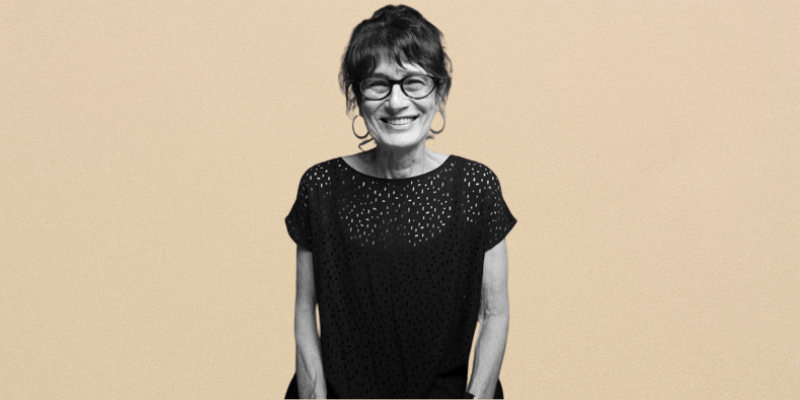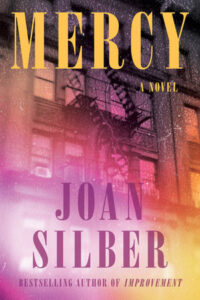
Joan Silber on the Process of Discovery, Fiction About Friendship, and the Meaning of Mercy
Jane Ciabattari Talks to the Author of Mercy
Joan Silber is a contemporary genius at creating artful stories of a multitude of characters who ricochet in cunning ways, crossing generations and continents. I named her 2017 novel Improvement a best book of the year in my BBC Culture column. Improvement, centered around Reyna, a New York single mom with tattoos whose life is influenced by fateful moments, random meetings and accidents, won the National Book Critics Circle fiction award and the PEN/Faulkner award. Secrets of Happiness, her next novel, revolves around a cast of characters whose lives intertwine in ways even they don’t know at the beginning of the book, as secrets and deceptions unfold. Mercy, her new novel, is equally effortless, empathetic, engrossing.
How did she decide to create a timeline that spans decades, from the early 1970s to today, with six narrative points of view and locations from New York City to a Mien village in Northern Thailand to film studios in Los Angeles? I asked. “This is my tenth book, and I have my own history with the form of the novel,” she notes. “The first one covered a whole lifetime—in my ignorance, I thought that was normal—and by the fifth book of fiction I had found this form using different narrators and places and time-frames. It allows me a larger view while keeping the intimacy of the close gaze. And I love moving around, love seeing the links.”
Our email conversation crossed the continent.
*
Jane Ciabattari: What was the seed for this novel?
Joan Silber: As a longtime New Yorker, I had always heard tales of overdosed drug users abandoned on the steps of hospitals. I thought there were hidden dramas behind these. And I always think there could be more fiction about friendship—its tests and its gifts—so the tale began to unfold from there.
JC: How did you arrive at the title, which echoes in scenes and lyrical lines throughout the book?
JS: I originally thought it was going to be about remorse and regret. But the workings of mercy ended up being more interesting to me. We all ask for mercy every day, and there’s never enough in the world. I began to see its forms—subtle and crucial, denied and fulfilled—in the story.
And opium is, of course, the drug of mercy. I began with the dangers of heroin, but I wanted to also show the useful mercies of opium in indigenous cultures (I’ve done a lot of traveling in southeast Asia, but I could’ve used other places) and our own custom of relieving the pains of severe illness with morphine.
My method is to guess and re-guess and to find details that will connect with ideas already in there.
JC: Ivan, your first narrator, does heroin with his best friend Eddie in the early 1970s until one night Eddie ODs and ends up in the ER at St. Vincent’s. Ivan, unable to revive him, fearing arrest, walks out, assuming he is dead. His remorse follows him forever. Astrid aka Ginger, an early girlfriend of Eddie’s, begins an acting career with an advertisement for milk (“No sex, drugs and rock’n’roll , only pure dairy.”) She has a child with Val, who leaves her for a road trip and dies when his car explodes; even after she achieves Hollywood fame he lingers in her thoughts. Isabel is the granddaughter of Steve, her grandmother’s long-absent ex-pat ex-husband who settled in Bali, and suddenly reconnects with her mother, his daughter Cara, as he faces a fateful end. Isabel’s mother Cara’s best friend is Nini, who also tells her story. How did you go about building each character? And connecting them to the others?
JS: I would describe my method as trial-and-error. But I love working with characters —that’s the most vital part for me. I invent them for a need—I wanted there to be a female present for the drug scene, so I brought in Astrid, and then gave her a life after. And I did want an outsider as witness in the ER—hence Cara. I loved the line I made up for Cara’s friend, Nini—“Sexual behavior is a social construct”—so I followed her into anthropology. And I’d mentioned the absent father in Bali, so I got curious about his fate. My method is to guess and re-guess and to find details that will connect with ideas already in there.
I’ve never been a writer who knows what she’s doing before she sets out.
JC: Mercy is, in ways, an echo chamber; reverberations of accidental deaths, twists of fate taking lovers apart from each other or connecting them to others, cancer, a range of drugs used, rehab programs. Regrets, remorse, longing for loved ones. Did these echoes develop in an organic manner? Did you have a system?
JS: I would not say I have a system but I have a habit. I’m looking for ways this bit I invented can connect to something else already in there.
JC: Did you have the ending’s narrative character—a surprise, and no spoilers to ruin it for the reader—in mind from the beginning? Or did that evolve as you worked on the book?
JS: I always had the character in mind but I didn’t know how the book would be formed. I’ve never been a writer who knows what she’s doing before she sets out. I like that process of discovery, but it’s often a little on the excruciating side.
JC: What were the biggest challenges in writing this novel?
JS: The last chapter was hard to write, and hard to hide. I didn’t know at first that suspense was going to be involved. And the character’s views needed to be clearer in spots. My editor, Dan Smetanka, was a great help.
JC: Were there any novels you would consider influences or models for this approach?
JS: I learned a great deal from Alice Munro, in her belief that time could be contained in shorter prose and that the meaning lay in getting it all in. I’ve always loved Chekhov, who moves in and out in his narrative distance.
JC: What are you working on now/next?
JS: I’ve done a few stories. One has to do with a mother’s tale of growing up in an Ashkenazi Jewish settlement in China, and one involves twenty years of friendship between women and an arrest by ICE.
__________________________________

Mercy by Joan Silber is available from Counterpoint Press.
Jane Ciabattari
Jane Ciabattari, author of the short story collection Stealing the Fire, is a former National Book Critics Circle president (and current NBCC vice president/events), and a member of the Writers Grotto. Her reviews, interviews and cultural criticism have appeared in NPR, BBC Culture, the New York Times Book Review, the Guardian, Bookforum, Paris Review, the Washington Post, Boston Globe, and the Los Angeles Times, among other publications.



















